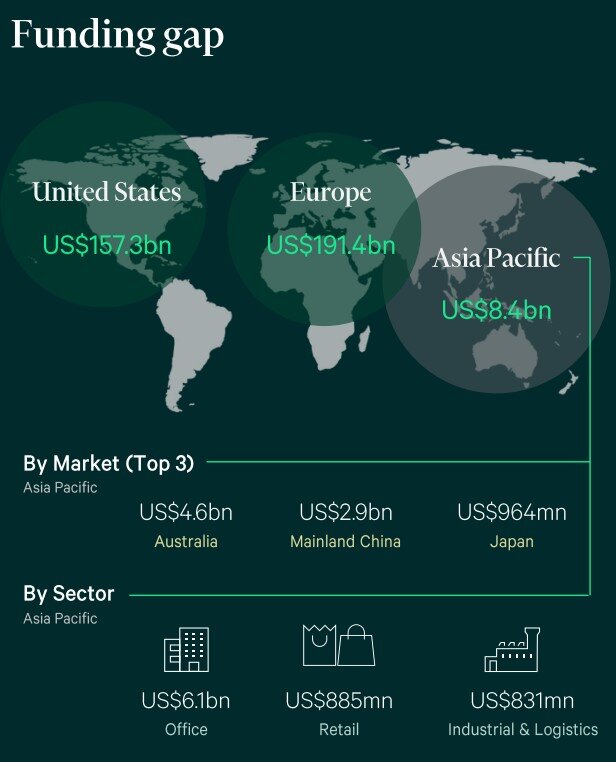Commercial Real Estate News

Asia Pacific Office Sector to Further Reprice Throughout 2024
Commercial News » Sydney Edition | By Michael Gerrity | June 4, 2024 9:27 AM ET
Based on new data by CBRE, Outstanding senior commercial real estate debt in Asia Pacific totals at least $257 billion, with a funding gap of $8.4 billion expected between 2024 and 2026. This is a much narrower gap than investors in the other major regions.
The debt funding gap in Asia Pacific is relatively small, compared with Europe ($191.4 billion) and the U.S. ($157.3 billion), owing to the limited repricing in Asia Pacific when compared with other regions. This limits opportunities for distressed assets and Non-Performing Loans (NPLs) in the region. Australia faces the largest funding gap at $4.6 billion, followed by mainland China at $2.9 billion.
The office sector is expected to face the most significant gap, with further asset repricing anticipated throughout the remainder of 2024. This repricing will particularly affect secondary properties that are currently out of favor with tenants. However, distressed office acquisitions will be limited in selective markets.
With 72% of debt origination in Asia Pacific over the past three years being recourse loans, the actions of banks will determine the extent to which the debt funding gap leads to distress sales. If banks become more aggressive in pursuing assets within underperforming investor portfolios, the risk of distress in certain markets and sectors will increase.
"With cap rate's expansion set to moderate and rates likely to stay higher for longer in Asia Pacific, we anticipate increased buying opportunities in the second half of 2024, particularly in the office sector. CBRE expects commercial real estate investment volume in Asia Pacific to grow by 5% year-on-year in 2024, led by Japan while other markets are poised to recover from a lower base," said Greg Hyland, Head of Capital Markets, Asia Pacific for CBRE.
Property owners that want to refinance need to carefully monitor Interest Coverage Ratios (ICRs) and interest expenses. The analysis shows that refinancing costs in Australia and Hong Kong SAR could be up to 1.9 times higher over the next two years. Japan will also undergo restructuring in interest expenses following the end of negative interest rates.
"Equity investors can find attractive opportunities, while alternative lenders may benefit from working with banks to restructure commercial real estate and development exposure in specific markets," said Dr. Henry Chin, Global Head of Investor Thought Leadership & Head of Research, Asia Pacific for CBRE.
Sign Up Free | The WPJ Weekly Newsletter
Relevant real estate news.
Actionable market intelligence.
Right to your inbox every week.
Real Estate Listings Showcase
Related News Stories
Commercial Real Estate Headlines
- U.S. Commercial Mortgage Delinquencies Rise in Q2, CMBS Loans Lead the Surge
- Tokenization-Focused Real Estate Investment Bank Announced
- Commercial Cap Rates Edge Lower in U.S., Hinting at Market Turn
- WPV Targets New $6 Trillion Digital Real Estate Tokenization Opportunity
- $1 Trillion in Data Center Development Underway Through 2030
- WORLD PROPERTY VENTURES: The 'Anti-VC' of Real Estate Plans Major Capital Raise
- Multifamily Sector Enjoys Record Absorption in U.S. as Supply Slows, Vacancies Drop
- Employee Back-to-Office Attendance Surges in U.S.
- Phnom Penh Commercial Property Sectors Face Crosswinds in 2025
- World Property Bank Announced to Capitalize on Coming Trillion-Dollar Tokenization Boom
- REAL ESTATE PREDICTIONS: Decentralized Events Contract Exchange in Development
- U.S. Architecture Billings Improve Slightly in May
- Tokyo Office Demand Spills into Non-Core Wards in 2025
- AI Hyperscalers Drive Record Data Center Leasing in Early 2025
- Commercial, Multifamily Mortgage Debt in U.S. Hits Record $4.81 Trillion in Early 2025
- U.S. Multifamily Market Rebounds in Early 2025
- U.S. Office Market Experiences Historic Conversion Shift
- New York City Enters New Era of Office-to-Residential Conversions
- World Property Ventures Plans New Capital Raise
- U.S. Commercial Real Estate Lending Rebounds Sharply in Early 2025
- U.S. Multifamily Housing Confidence Declines in Early 2025
- Asia Pacific Commercial Investment Holds Steady in Early 2025
- Carnival Plans New Miami Headquarters Spanning Over 600,000 Square Feet
- Hong Kong Property Investors Take a Wait-and-See Approach Due to U.S. Tariffs
- U.S. Multifamily Buyer and Seller Sentiment Improves in Early 2025
- One Trillion Dollars of America's Commercial Property Loans Mature in 2025
- U.S. West Coast Dominates Self Storage Demand
- Phoenix, Orange County and Inland Empire Emerge as Leading U.S. Industrial Markets
- U.S. Mega Distribution Centers Leasing Activity Grew in 2024
- U.S. Commercial Borrowing to Increase to $583 Billion in 2025, Up 16 Percent Annually
- Demand for U.S. Life Sciences Space Spikes 28 Percent Annually in Late 2024
- Multifamily Property Sector in America Rebounding
- Asia Pacific Commercial Property Investment Spikes 23 Percent in 2024
- U.S. Commercial Property Market Primed for Growth in 2025
- Architecture Industry Sees Mixed Signals as 2025 Approaches
- Global Data Center Demand Spikes in 2025
- 2025 Prediction: U.S. Commercial Investment Recovery Expected to Gain Traction
- Holiday Retail Sales for 2024 to Hit Record $1 Trillion
- Tech, AI Industries Drive Largest Share of Office Leasing Activity in U.S.
- Commercial Real Estate Lending in U.S. Enjoys Strong Growth in Q3








